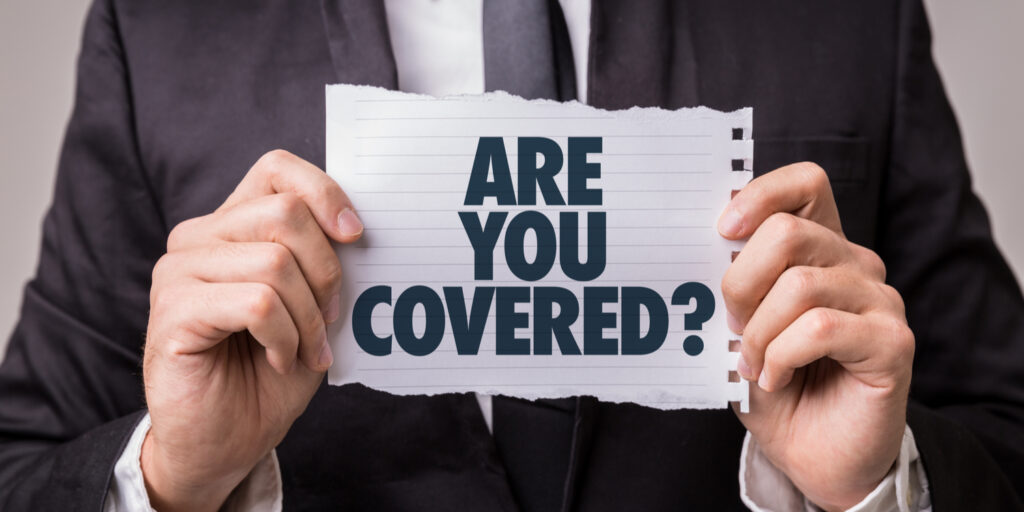There are a wide range of business insurance products tailored for SMEs. Certain types of insurance are mandatory, depending on the circumstances of the business, and there are many policies designed for specific industries. Let’s take a look at 10 of the most common forms of business insurance.
Employers’ Liability Insurance
Any business with employees is legally required to take out Employers’ Liability Insurance. This policy must be obtained from an authorised insurer and provide a minimum of £5 million of cover.
The purpose of Employers’ Liability Insurance is to enable an employer to pay compensation to an employee who suffers injury or illness in the workplace or as a result of work-related activity.
Failure to obtain Employers’ Liability Insurance can result in a fine of £2,500 for each day a business has employees on their books without cover. An additional £1,000 fine can be levied if an employer does not display their Employers’ Liability Insurance certificate on their business premises.
Motor Insurance
Anyone who uses a motor vehicle for their business must ensure they have at least third-party motor vehicle insurance cover. This is a legal obligation for commercial vehicles as well as personal vehicles.
If a business provides company cars to its employees, it is the responsibility of the business to obtain the minimum requirement of third-party insurance for its fleet of vehicles.
Where a business relies upon its own vehicles, such as a transportation company, it is wise to get comprehensive insurance cover. The provision of temporary replacement vehicles by an insurance company, while repairs take place, will be vital in minimising any loss of revenue.
Public Liability Insurance
Businesses whose premises are open to the general public – especially retail and hospitality sectors – are strongly advised to get Public Liability Insurance. This protects a business from claims made by members of the public who are injured on the premises, such as from a slip or trip.
B2B companies can also benefit from Public Liability Insurance if their clients or suppliers visit their offices or warehouses etc.
Directors’ Liability Insurance
Directors’ and Officers’ Insurance – commonly known as D&O Insurance – covers the management team of a company when it comes to claims that are made against them in the course of carrying out their duties.
D&O Insurance can be used to pay for legal fees required to defend against a variety of claims, including breach of health and safety laws, financial reporting errors, pension maladministration, and director disqualification.
Product Liability Insurance
Businesses that manufacture consumer goods and other products will benefit from Product Liability Insurance. This covers the cost of compensation for any injuries sustained by customers or third parties due to a faulty product.
As well as injuries, it will also cover damage to property, such as if a faulty electrical product causes a fire.
Professional Indemnity Insurance
Businesses that offer a professional service or advice – notably healthcare, legal and financial professions – can be sued if their work results in physical, financial, or reputational harm to clients. Professional Indemnity Insurance can help to cover the cost of litigation and compensation for these type of claims.
Some professions stipulate that their members take out specific forms of Professional Indemnity Insurance as a condition of practicing their trade, e.g. the Solicitors Regulation Authority (SRA) requires all law firms to “take out and maintain professional indemnity insurance that provides adequate and appropriate cover”.
Commercial Building Insurance
Businesses that own offices, warehouses, factories, or other buildings, will generally have an insurance policy that covers the structure of their buildings. If they have a mortgage on the property, Building Insurance cover will be required by the mortgage company.
Commercial Building Insurance will cover the cost of repairing accidental damage, such as fire. It will not always cover damage caused by flooding – so this should be discussed with the insurance provider.
Business Equipment and Contents Insurance
Most businesses rely on equipment – at the very least a laptop. Manufacturers will often have complex and expensive machinery that is crucial for their production line. Other businesses will have specialised equipment that often needs to be transported, such as plant machinery for building sites.
- A guide to employers’ liability insurance for limited companies
- What is directors and officers insurance?
- Company policies every business should have
In the case of offices, a Contents Insurance policy will cover against theft of laptops and other technology. A more comprehensive Business Equipment Insurance policy can also cover the cost of repairing or replacing equipment that has broken down or been damaged due to transportation etc.
Cyber Insurance
One of the biggest threats facing modern businesses is the risk of a data security breach. External malicious hackers and internal sources can compromise confidential client data, trade secrets and other sensitive company information.
Cyber Insurance is designed to cover legal costs, fines, compensation payments, and sometimes the cost of repairing reputational damage as a result of a data breach. However, it’s important to carefully check the terms of any Cyber Insurance policies, as they can require a certain level of technical precautions to be taken to make a valid claim.
Business Interruption Insurance
Occasionally, the day-to-day trading activities of a business may be disrupted as a result of an unforeseen event, such as a fire or flooding. Aside from the costs of repairing any damage – which may be covered by other policies such as Building Insurance – there will also be the loss of revenue caused by the disruption. Business Interruption Insurance is designed to reimburse the loss of expected revenue.
This type of policy can vary drastically, so it’s crucial to ensure that the terms are fully understood – and tailored if possible.
And there you have it, 10 types of business insurance that any prudent business owner needs to be aware of. We hope you found this useful.
Please note that the information provided in this article is for general informational purposes only and does not constitute legal, tax, or professional advice. While our aim is that the content is accurate and up to date, it should not be relied upon as a substitute for tailored advice from qualified professionals. We strongly recommend that you seek independent legal and tax advice specific to your circumstances before acting on any information contained in this article. We accept no responsibility or liability for any loss or damage that may result from your reliance on the information provided in this article. Use of the information contained in this article is entirely at your own risk.










Join The Discussion
Comments (2)
This has really helped me to understand what type of insurance I will require for my company, thank you!
We’re pleased you found this article useful Laura. What does your company do for a living?
Regards,
The 1st Formations Team